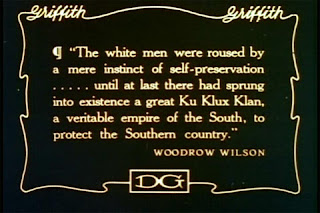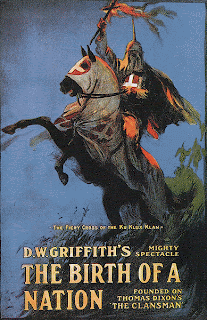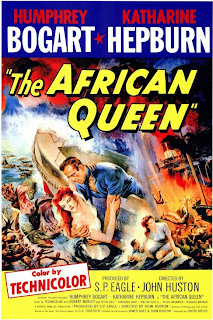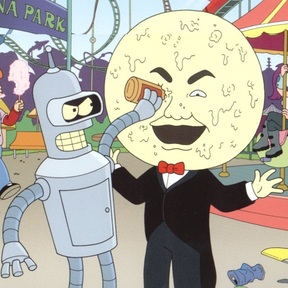The Birth of a Nation (1915)
D.W. Griffith's epic The Birth of a Nation is a very difficult film to write about. This review has been a nightmare, and even after finishing it I almost wish I'd never started it. There's so much background to the film, it's hard to be judgmental without understanding the motives and context. This is primarily because of the immense controversy that will forever follow the film, but it's also the one film that could be said to have influenced cinema more than any other. It's unfortunate that such a pivotal and important film was to depict (not very accurately) one of the United States' most shameful periods, at the height of slavery. In spite of this, however, to look at the film objectively there's still no mistaking the immense power it has. At a massive twelve reels, and with a runtime of over three hours, it was well over twice as long as any feature film any audience had ever seen, and pioneered the use of many camera techniques which are now considered commonplace (including, believe it or not, the close up!). Griffith was, however, rewarded for gambling on such an audacious project, with The Birth of a Nation becoming the most successful film in history all the way up until 1937 and Snow White and the Seven Dwarfs.
Putting the controversy to one side for a moment, watching The Birth of a Nation even today and it's easy to see why it proved to be such a commercial success. I can imagine the ecstatic audiences filing out of the cinema full of patriotic glory. Some of the shots used in the final few scenes, with an apparition of Christ looking down over the masses were years ahead of their time.
D.W. Griffith based the film closely on The Clansman, a novel by Thomas Dixon, published a decade earlier. I found the story quite difficult to follow at points, and it's certainly not an easy film to watch, not helped at all by its 187 minute runtime. [Skip to the next paragraph if you really don't want to know what happens during the film...] The first half sets the scene with two happy families who are close friends but as the film progresses they end up fighting on opposite sides in the American Civil War of 1861-65. With the men of the families away at war, the black militia move into town and terrorise the locals. The sons of the families refuse to fight each other, and are both killed in the war. We then see the war ending and, one of the highlights of the film for me, Lincoln's assassination, which is played out with such suspense, helped by the audience's knowledge of what inevitably is coming next. It's in the second half of the film, entitled "Reconstruction" that we see the formation of the Ku Klux Klan, created to keep the black people at bay. One vivid moment is when Gus, an educated former slave, proposes to the daughter of one of the families. Scared by Gus (played by a white actor in blackface, giving him the appearance more of a monster than a man) she runs into the forest, and when Gus follows her up a mountain, she throws herself to her death rather than be close to Gus. Poor Gus. His troubles are only just beginning however, as the KKK track him down, kill him and throw his body onto the doorstep of the local Governor. We then see how the 'uneducated blacks' are taking office in Southern communities and beginning to take over but, just as it seems the whites have nowhere to turn, the KKK come riding valiantly into town and send the blacks packing. We get a nice ending where the main characters finally get together, and some imagery of Christ to top it off. What more could a circa-1915 movie-going public want?
 |
| The unfortunate Gus, at the hands of the KK |
That's the main story, as much as I could follow it. Now for my thoughts on the film. As it starts, it doesn't really feel like the game-changing epic that it is, but certainly as the film goes on (and on) you do start to see that this was something very special indeed. The sequences during the Civil War are well done, especially considering nothing on such a scale had been done before. Some of the titles here were well thoughout too, my personal favourite was the provocative "In the red lane of death others take their places and the battle goes on into the night."
I loved to see the closeup shots of characters faces, especially when Gus is stalking Flora through the woods, used sparingly but to great effect. Cinematically, the final few scenes were my favourites, with scenes of sunsets superimposed over the main characters on their honeymoon. Scenes like this really do elevate The Birth of a Nation well above anything else around this time.
The acting is pretty good throughout, and Lilian Gish, a mainstay of many of Griffith's best works, is absolutely adorable here. Also look out of Mae Marsh playing Flora Cameron who's the absolute dopplerganger of Spaced star Jessica Hynes. However, it's also immediately noticable that pretty much every major black character is a white actor in blackface. I'm aware that there weren't many black actors around at this time (though there were a few, by 1915 the 'Ebony Film Company' was well-established), but it's plainly apparent that these were white actors, to the point that I got confused whether the character was supposed to be black or white. When black actors do appear, they are usually as extras, playing up to stereotypes of the period.
So what one earth was Griffith thinking? Even in 1915 it wasn't acceptable to have black people as villains and the KKK as divine heroes! The 'National Association for the Advancement of Colored People', still in its infancy, raised their concerns about the inaccuracy of the film. I'm far from an expert on American history, but it's a complete lie to say that at this time illiterate, self-serving negroes were getting themselves into the House of Representatives in the South, resulting in many white people being to afraid to leave their homes. To then present the film as facsimile and portray the KKK as being sent by God to deal with them was grossly insensitive and inaccurate. Griffith seemed to present the film as a product of free speech, and peppered it with racist quotations from then-President Woodrow Wilson:
 |
| No, Woodrow, no! |
So for me it's back to the comfort of Murnau, Chaplin and Keaton before I eventually summon up the courage to watch Intolerance. The Birth of a Nation is a complete cinematic masterpiece, no arguments, but due largely to the massive historical inaccuracies, which left a bitter taste a century ago, let alone today, it's also one of the most offensive films I've ever seen.





Comments
Post a Comment